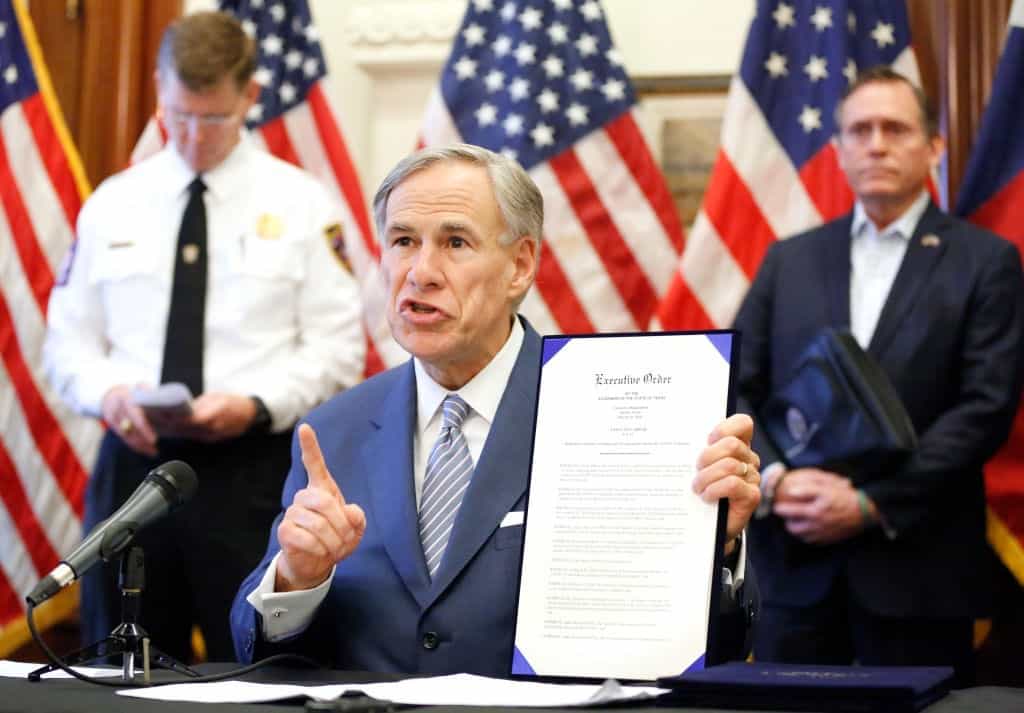Last Thursday, Austin City Council voted unanimously to purchase a North Austin hotel to help address its much-maligned housing issues. The move, which came at a cost of $9.5 million, is expected to provide 65 permanent units and on-site resources to help unhoused people transition off the streets.
Beyond adding a third hotel into Austin’s arsenal of what Council Member Greg Casar says is “permanent, supportive housing that’s accessible far faster than building new structures,” the site will be home to medical, mental health care, and job placement services. Council Member Mackenzie Kelly, who entered office last month amidst swirling concerns about her extreme right-wing views, also backed the acquisition.
But if Gov. Greg Abbott’s six years in office have shown anything, it’s that even the most straightforward solutions to Texans’ problems are fodder for political theater — especially if the capital city is involved. As the Texas Signal has documented, Abbott has made Austin’s 2019 decision to repeal its camping ban one of his favorite talking points. In addition to levying frequent threats against Mayor Steve Adler on Twitter alongside images of tent-lined highway overpasses, the governor has shared posts containing inflammatory (and, in several cases, unsubstantiated) claims to stoke public fear. He’s also circulated years-old videos and said he could easily solve homelessness.
“Fixing homelessness in ATX is easy,” Abbott tweeted last February. “1. Put public safety first. 2. Open large shelters that can accommodate > 200 people. 3. Provide mental health, drug addiction help + job training skills. 4. Then focus on long term housing. Austin doesn’t have the leadership to do this.”
Despite Abbott and groups like Save Austin Now (the conservative coalition led by Travis County GOP Chairman Matt Mackowiak) painting Austin’s strategy as recklessly naive, proponents argue that it’s anything but. By decriminalizing panhandling and camping, the city is prioritizing long-term solutions over attempts to temporarily hide its affordable housing problem through arrests and citations, housing advocate Chris Harris has said. To this point, a 2017 City of Austin audit found that local police issued 18,000 tickets for camping, sitting, lying, or panhandling during the three years prior. 90 percent of people cited failed to appear in court; a warrant for their arrest was then issued in three-quarters of those cases.
The numbers are clear, Casar says: spending money to criminalize homelessness is a waste of resources. “Everybody knows that just throwing somebody in jail for a night doesn’t actually solve homelessness,” he says. “We direct so many resources trying to police our way out of poverty, instead of utilizing those resources to solve the actual issue. We’re proving there’s a far better alternative to that.”
Austin’s latest hotel purchase is a particularly stinging rebuke of Abbott because it was made possible by reducing its police budget by more than $20 million last August. In the months since that heavily scrutinized decision, the governor and his allies have cast Austin (and Casar specifically) as lawless liberals on billboards and in campaign attack ads — a strategy that, at least in part, worked to aid Republicans’ latest statewide route at the polls. Now, with yet another $6.5 million hotel expected to be confirmed in Kelly’s more conservative District 6 during Thursday’s upcoming meeting, disinvesting from police will assuredly be a popular topic once more.
And yet, while adding nearly 150 permanent housing units is a substantial win for Austin homelessness advocates, continued progress over the next several months won’t be easy. Led by Mackowiak, Save Austin Now appears primed to send the city’s campaign ban to a May ballot referendum after gathering tens of thousands of signatures from supporters. Even more, Abbott named punishing local governments that “defund the police” one of his five emergency items for the current Texas Legislative session during Monday’s State of the State address — a move that could include freezing property tax revenues. Given the governor’s track record of targeting municipal policies like Austin’s 2018 paid sick leave ordinance, it’s likely that he’ll translate his disavowal of the city’s approach to policing and homelessness into legislative action.
“If Austin doesn’t reinstate the ban on homeless camping the state will do it for them. Contrary to what Austin leaders think no one has a right to urinate & defecate wherever they want,” he said in a January 20th tweet. “Homelessness promoted by Austin has also endangered public safety.”
With pressure continuing to mount, cracks have begun to show in Austin leaders’ once-fortified front. Adler has admitted that the city’s approach to homelessness is “not good enough and is not working the way it needs to”— a sentiment reflected in his recent show of support for exploring the construction of city-sanctioned homeless encampments. That’s a significant shift, considering that idea was wholly rejected by his staff in 2019 when the governor built his infamous “Abbottville” camp. Moderate Council Member Ann Kitchen floated a similarly regressive alternative on Tuesday through her Housing-Focused Homeless Encampment Assistance Link (HEAL) program, which would ban camping in specific parts of the city.
There’s no doubt about it: Austin’s homelessness strategy is at a critical juncture. Gov. Abbott, a looming ballot referendum, and the dozens of protesters fighting to reject Thursday’s vote on an additional hotel all represent legitimate threats to the city’s ongoing plans.
Casar says with housing prices skyrocketing around town (Austin was named the worst city in America for minimum-wage workers in a move.org study last fall) and the COVID-19 pandemic still surging in Texas, now isn’t the time to cut public services. Instead, Austin must remain steadfast in its commitment to providing safe shelter and a pathway off of the streets to its most vulnerable residents.
“The capacity of our traditional shelters has been cut in half by the pandemic because of how risky it is to cram people into tight quarters. That means even more people are being forced to live in tents, under bridges,” he says, noting that the city is in negotiations to purchase a third hotel in 2021. “By letting off the gas just a little bit on rapidly growing police budgets and reinvesting in community solutions, we’re showing that rethinking public safety is not only progressive and right, but that it works.”
Photo: Tom Fox-Pool/Getty Images





